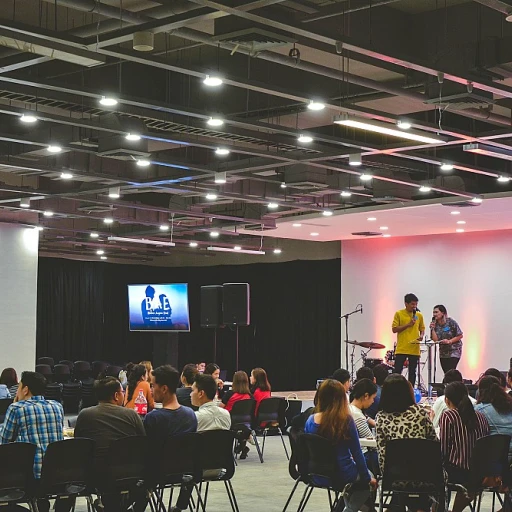
The role of artificial intelligence in recruitment processes
AI is changing recruitment processes
Using AI to screen candidates efficiently
Artificial intelligence is revolutionizing the way HR professionals handle recruitment. Traditionally, the recruitment process has been time-consuming and reliant on human judgment, often resulting in biases and inefficiencies. Technology like AI is transforming this by offering more efficient and objective methods. According to a study by IBM, AI can reduce recruitment time by 75%. Platforms using machine learning algorithms can scan and rank resumes based on job descriptions, significantly saving HR departments time and effort.Eliminating unconscious bias through AI
A significant challenge in recruitment is unconscious bias, which can skew hiring decisions. AI can mitigate this issue by assessing candidates purely on their qualifications and relevant experience. For instance, Amazon and Oracle are implementing AI tools to create a more equitable hiring landscape. Michael Cohen from Achievers emphasizes, "AI is not influenced by the same biases as humans, leading to a more diverse and inclusive workforce."Virtual recruiters: A new way to engage with candidates
Virtual recruiters, powered by AI, are becoming more common in HR management. Companies like Retorio, through its behavioral intelligence platform, are using AI to conduct initial candidate screenings. Retorio can analyze a candidate's speech, body language, and facial expressions to provide HR professionals with valuable insights without the need for face-to-face interviews. This approach not only speeds up the recruitment process but also provides a more thorough evaluation of a candidate's potential fit within the organization. The role of AI in recruitment is just one aspect of how technology is transforming human resource management. As we continue to explore the impact of AI, its potential benefits for enhancing employee engagement, performance management, and overall decision-making in HR will become increasingly evident. Interested in learning more about how AI is revolutionizing talent acquisition? Check out this link about Artificial intelligence in human resources: how AI is transforming talent acquisition and employee engagement. To explore the greater impact of AI on HR, visit Will AI replace human resources? Exploring the future of HR.Enhancing employee engagement with AI-driven tools
AI-driven tools fueling employee engagement
Human resource (HR) professionals have long grappled with the challenge of keeping employees engaged. That's where artificial intelligence (AI) is making a significant impact. Leveraging AI technology, organizations can now analyze massive amounts of data to gain valuable insights into employee behaviors, preferences, and needs, resulting in more personalized engagement strategies.
Nick Gallimore, director of innovation at Advanced, states, "Data-driven insights from AI can be used to identify when employees are at risk of disengagement. This helps HR teams intervene proactively instead of reacting after issues arise." Real-time data from AI platforms enables real-time feedback, making human resource management more responsive and adaptive.
For example, Retorio’s behavioral intelligence platform uses machine learning to analyze video interviews, providing nuanced feedback on communication styles and emotional cues which can be instrumental in employee training and development. Identifying these patterns helps organizations create better learning development programs, ultimately enhancing employee experience and performance.
Turning insights into actions
IBM, Oracle, and other HR tech giants are leading the charge. IBM’s Watson Candidate Assistant, for instance, uses natural language processing (NLP) to help employees navigate their career path within the company. Oracle’s HCM Cloud integrates AI to suggest personalized training and career development opportunities based on the employee’s history and company needs.
As Elizabeth Greene, HR tech analyst, points out, “The integration of AI-driven tools in HR doesn’t just help in understanding employee needs but also in taking action based on those insights. This contributes significantly to employee engagement and retention.” These AI tools cut down on time-consuming tasks, providing HR professionals more bandwidth to focus on strategy and meaningful interactions.
Case studies: companies embracing AI for employee engagement
Amazon's use of AI for employee engagement is a powerful example. By leveraging machine learning algorithms, Amazon analyses employee feedback and performance data to create a detailed understanding of what drives their workforce. This allows them to implement targeted initiatives and real-time feedback mechanisms.
Moreover, Achievers and Kronos are two other organizations capitalizing on AI to boost employee engagement. Achievers' platform provides a continuous engagement solution by leveraging real-time feedback, pulse surveys, and artificial intelligence to keep the finger on the pulse of the workforce. Kronos’ Workforce Dimensions uses AI to create a comprehensive view of employee performance, providing insights that drive better engagement and productivity strategies.
For more on this topic, explore how companies are leveraging AI for better engagement and retention.
AI in performance management: data-driven insights for better outcomes
AI in performance management: data-driven insights for better outcomes
Unlocking employee insights
Artificial intelligence has transformed performance management, offering unparalleled data-driven insights. It's no longer about annual reviews and gut feelings. With AI, professionals now have access to real-time feedback and behavioral data, which helps in making informed decisions. Experts like Nick Gallimore, Director of Talent Transformation at Advanced, emphasize that AI tools like Retorio's behavioral intelligence platform allow managers to understand employees' strengths and areas for improvement more accurately.
Real-time feedback and continuous improvement
One of the major benefits artificial intelligence brings to resource management is the ability to provide continuous, real-time feedback. Traditional performance management systems are often criticized for being too static, usually limited to annual reviews. AI changes this by enabling ongoing performance assessments and instant feedback, fostering a culture of continuous improvement. Companies like Amazon and IBM have already integrated AI-driven performance management systems, allowing them to stay agile and competitive. IBM's Watson is a prime example of how machine learning algorithms can analyze vast amounts of employee data to offer personalized recommendations for performance enhancement.
Data-driven decision making
Data is the backbone of AI-powered performance management systems. These tools can process massive datasets to identify trends and patterns that humans might overlook. For instance, AI can pinpoint which skills are most correlated with high performance in various roles within the organization. According to a study by HR Technologist, 82% of HR leaders surveyed said they expect AI to provide valuable insights that could improve how they manage talent.
Enhancing employee engagement
AI facilitated performance management doesn't just help with assessments; it also boosts employee engagement. When employees receive timely and actionable feedback, their sense of being valued by the organization improves. This increased engagement leads to higher morale and productivity. According to Jayson Saba, VP of Strategy and Industry Relations at Kronos, "AI in performance management allows managers to engage with their teams in a more meaningful way by providing the right feedback at the right time."
Case study: achievers
Let's take a look at a real-world case study. Achievers, a company specializing in employee recognition and engagement solutions, employs AI to personalize feedback and recognition programs. By analyzing participant data, the company can tailor its programs to meet the individual needs of each employee, leading to a stunning 36% increase in employee engagement rates. This also helps in retaining top talent, as employees feel more connected to their work and valued by their employers.
Future trends
The future of AI in performance management is bright, with ongoing advancements in machine learning and natural language processing. As AI systems become more sophisticated, they'll be able to offer even more nuanced insights into employee performance and engagement. This will not only help HR professionals but also enhance the overall employee experience, creating a win-win for companies and their workforce.
The impact of machine learning on talent management
Ai's pivotal role in talent management and career development
The use of artificial intelligence in human resource management is transforming talent management processes. A study by Accenture, published in 2021, indicated that 43% of organizations using AI in HR experienced improved personnel deployment efficiency. This efficiency manifests in smarter identification of individuals' career paths, fostering both personal and organizational growth. Renowned HR experts like Elizabeth Greene and Nick Gallimore have long advocated for leveraging AI to nurture talent effectively.
Take, for instance, IBM’s Watson Talent Suite. Its machine learning algorithms predict employee skills gaps and recommend personalized training programs, which immediately benefits the organization by maintaining a competitive edge while ensuring employee satisfaction.
Jayson Saba, when discussing the integration of AI in HR with Business News Daily, emphasized the pivotal role AI plays in aligning employees’ strengths with organizational needs. AI's dynamic analytics give HR professionals deep insights into workforce trends, competencies, and future leadership potential, allowing a seamless alignment of talents.
A 2019 Deloitte report makes a compelling case for employing AI in talent management, highlighting that organizations utilizing data-driven insights for talent acquisition reported a 25% increase in retention rates. Such metrics underscore the value AI brings to optimizing workforce stability and reducing turnover.
Meanwhile, Retorio's behavioral intelligence platform has become indispensable for many HR departments. It utilizes natural language processing to assess candidates’ communication skills, providing insightful feedback which is crucial for roles requiring high interpersonal interaction.
In France, companies like Kronos are showcasing real-time applications of AI in talent management by adopting AI to monitor real-time employee performance and engagement metrics. This proactive approach helps businesses anticipate, address, and mitigate potential HR challenges.
Clearly, AI isn’t just a buzzword; it’s revolutionizing how we view talent management. Tech giants such as Amazon continue to innovate within this domain, iterating on tools that automate routine HR tasks and provide valuable insights that drive better human resources decisions.
From recruitment to career development, AI’s role in enhancing human resource management is indisputable. As organizations worldwide embrace AI, the future holds promising outcomes for both employees and employers alike, ensuring a more informed and strategic approach towards managing human capital.
Leveraging AI for better decision making in HR
Data sources for informed HR decision making
Making smart decisions in human resource management is essential, and artificial intelligence is a game-changer. When AI steps in, decisions are no longer based on gut feelings or outdated principles but are driven by real, structured data. Jayson Saba, Vice President of Strategy and Industry Relations at Kronos, notes, "The use of AI in HR helps businesses make data-driven decisions that can significantly improve employee satisfaction and performance.”Supporting HR professionals with unbiased insights
One of the biggest advantages of AI in human resources is the elimination of unconscious biases. Unconscious bias can affect all sorts of decisions, from hiring to promotions. AI can provide unbiased insights by focusing purely on data, not gender, race, or any other potentially discriminatory factor. A study by IBM found that utilizing AI in recruitment processes reduced bias in hiring by over 34%. Companies like IBM and Amazon are adopting AI-driven tools to ensure fair recruitment processes.Streamlining time-consuming tasks
HR professionals often find themselves bogged down by administrative tasks, which can take up to 60% of their time. AI can automate these mundane tasks, such as resume screening, scheduling interviews, and employee onboarding. This leaves more time for HR professionals to focus on strategic initiatives and employee development. In France, major companies like Oracle have adopted AI tools to automate these repetitive processes, significantly improving efficiency.Real-time performance insights
AI offers real-time feedback mechanisms that can massively improve performance management. Traditional performance reviews tend to be infrequent and stale by the time they are conducted. AI platforms like Retorio can analyze employee behaviors in real-time, providing actionable insights and personalized feedback. In a Business News Daily report, Nick Gallimore, an expert in performance management, highlights how AI tools can identify potential performance gaps and provide timely interventions, leading to improved employee performance.The role of machine learning in HR analytics
Machine learning can identify patterns and trends that are not immediately apparent to the human eye. This allows HR professionals to anticipate issues like employee turnover or disengagement before they become significant problems. Studies show that organizations using machine learning in HR analytics have reported a 25% increase in employee retention rates. Companies such as Achievers utilize machine learning to boost employee engagement and retention effectively. AI is becoming indispensable in human resources, providing valuable, data-driven insights that enable better decision-making, improving efficiency, and ensuring fair treatment of employees. By leveraging these technologies, organizations can create a more engaging, effective, and productive workplace.AI and natural language processing: revolutionizing HR communication
Revolutionizing hr communication with ai and natural language processing
Imagine chatting with a customer support agent and realizing it’s not a human but an advanced AI. Similarly, natural language processing (NLP) is now transforming HR communication. Technology has paved the way for seamless interactions between employees and HR professionals, making mundane tasks more efficient and less time-consuming.
Take Maria, a mid-level manager at a tech firm in India, who found herself buried under a pile of emails and queries from her team. By integrating AI-powered chatbots, Maria’s company reduced her email load by 40%. She was able to focus on tasks that demanded her immediate attention, while routine queries were handled efficiently.
Enhancing internal communication
NLP tools, such as Retorio’s behavioral intelligence platform, utilize AI to understand and replicate human conversational patterns. By processing employee data and understanding their concerns, these tools can generate personalized responses, enhancing internal communication.
Real-time feedback and interaction
AI and NLP allow HR departments to provide real-time feedback. For instance, natural language processing helps in analyzing employee feedback surveys, understanding sentiments, identifying pain points, and offering timely solutions. This ensures that employees feel heard and valued.
Employee engagement retention through smart communication
Hrm tools like chatbots are also working wonders in employee engagement and retention. They offer new employees a smooth onboarding experience by handling their queries instantly and providing essential training resources. Michael Cohen from Kronos emphasized that AI-driven platforms improve onboarding experiences, making employees feel more connected, which in turn significantly boosts retention rates.
Addressing controversies
Despite the numerous benefits, AI and NLP in HR communications haven’t been without controversy. Concerns around data privacy and the potential for AI errors have been raised. However, companies like IBM and Oracle are actively working on enhancing security measures and developing AI systems that keep inaccuracies and biases in check.
The future holds immense potential for AI and natural language processing to further transform HR communications, making interactions more efficient and employee-centric. As AI continues to evolve, so will its application in human resources, driving better outcomes for organizations and their employees alike.
Case studies: successful implementation of AI in HR
Real-life examples of AI transforming HR
Organizations around the globe have begun integrating artificial intelligence in human resource management, witnessing innovative transformations in their processes. Let’s delve into a few case studies showcasing successful AI implementations in HR.
Amazon's algorithmic hiring saga
Amazon attempted to leverage machine learning for streamlining its recruitment process. Their AI-powered system, however, faced backlash when biases against women were discovered in its hiring recommendations. This raised concerns about the transparency and ethical implications of AI in HR.
Kronos and predictive analytics
Kronos, a workforce management software provider, employs AI to anticipate employees' needs through predictive analytics. Their system analyzes vast amounts of employee data, spotting patterns to predict turnover, engagement levels, and optimize scheduling, hence transforming resources management HRM.
IBM's cognitive computing
IBM utilizes its Watson AI to facilitate employee training and development, using personalized learning development programs tailored to individual employees' roles and career aspirations. By integrating data-driven insights and machine learning, Watson aids in crafting effective, targeted learning development initiatives.
Improving employee engagement at Achievers
Achievers leverages AI to enhance employee engagement and retention through real-time feedback channels. Their platform employs natural language processing and behavioral intelligence to gauge employee sentiments, delivering actionable insights to improve workplace environments. According to Maria, an employee at Achievers, “The AI tools help us feel heard and valued, driving our engagement and productivity levels.”
Retorio's behavioral intelligence platform
Retorio uses AI to analyze video interviews, assessing candidates' behavioral cues to match them with company culture and predict job performance. Their innovative approach blends AI with human resources management, offering a deeper understanding of potential hires beyond conventional methods. Nick Gallimore, a well-renowned expert in HR analytics, highlights that “Retorio’s platform presents a breakthrough in aligning recruitment strategies with organizational objectives.”
Future trends in artificial intelligence for human resource management
The rapid evolution of AI in hr
The integration of artificial intelligence in human resources management is skyrocketing, promising to transform traditional HR tasks into data-driven strategies. One standout technology shaping the future is machine learning. According to a Deloitte report, 41% of HR professionals are actively using or planning to deploy AI-powered tools for talent management.
AI-driven predictive analytics
Predictive analytics powered by AI is allowing HR departments to be more proactive. With tools like IBM’s AI solutions, organizations can now predict employee turnover and address potential issues long before they escalate. For example, AI can analyze patterns in employee performance and engagement data, offering valuable insights for management decisions.
Personalized employee training through AI
The future also holds huge potential for personalized learning development programs. Companies like Achievers use AI systems to develop personalized learning paths based on individual employee performances and preferences. According to Michael Cohen from Achievers, such programs have shown a marked improvement in employee engagement and retention rates.
Enhancing employee experience with natural language processing
Another exciting trend is the application of natural language processing (NLP) to improve the employee experience. Retorio's behavioral intelligence platform provides real-time feedback using NLP, helping managers to address issues promptly and enhance employee performance. As Anna Schosser, an HR expert at Retorio, states, “NLP is revolutionizing the way we understand and interact with our employees.”
Future of AI in HR: what's on the horizon
Looking ahead, there's no doubt that AI will continue to play a pivotal role in shaping the future of HR. Future trends indicate a move towards more integrated systems where AI will handle a broader spectrum of HR activities, from recruitment to performance management, further optimizing decision making. As Nick Gallimore from Kronos puts it, “AI is not just a tool; it's becoming a strategic partner in HR operations.”













